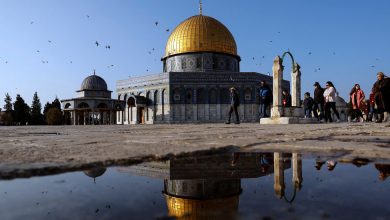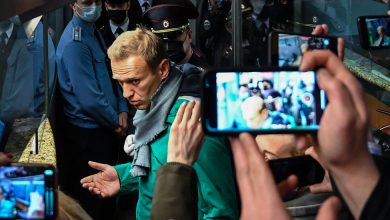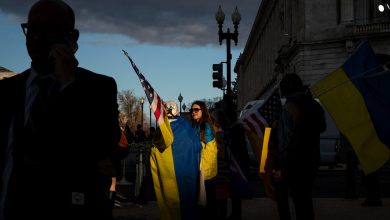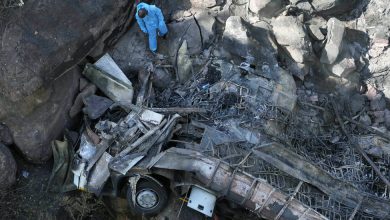With Heightened Anxiety, Putin Prepares Russians for Long Fight Ahead
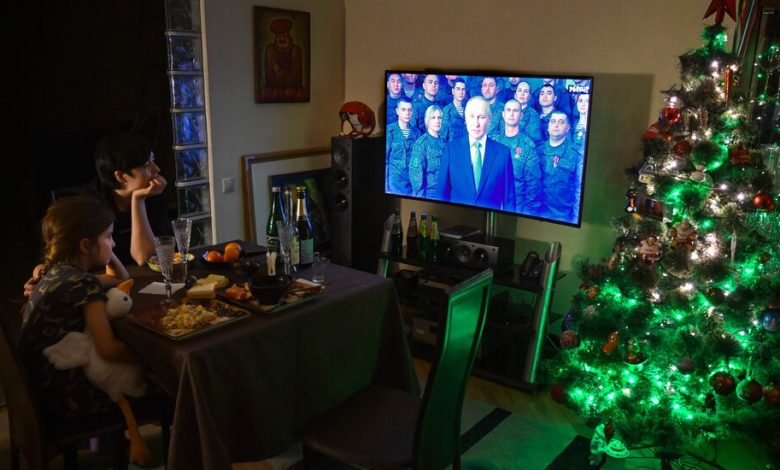
In footage released by the Kremlin on New Year’s Eve, President Vladimir V. Putin is seen chatting with soldiers, exhorting them: “We can’t give up anything. We must only fight, only keep going.”
He then adds: “Of course, there is still much that needs to be done.”
As winter sets in and the one-year anniversary of Moscow’s invasion of Ukraine looms next month, Mr. Putin has dropped his earlier efforts to shield the public from the pain of war and is now seeking to prepare Russians, and his own military, for a long fight ahead.
“He’s gotten a lot less relaxed, a lot less optimistic,” said Tatiana Stanovaya, a Russian analyst who studies Mr. Putin for her political analysis firm R.Politik. “You can sense a certain anxiety, a desire to mobilize all possible forces to achieve his goals.”
Keeping a low profile this week during Russia’s extended New Year’s holidays, Mr. Putin made no statement about Ukraine’s rocket attack in the city of Makiivka last weekend, in which Russia said 63 of its soldiers were killed (and Ukraine claimed there were hundreds of fatalities). The resulting torrent of criticism from pro-war bloggers on social media was aimed at Russian commanders and spared Mr. Putin himself, a pattern evident over months of blunders by Russia’s military.
A memorial service on Tuesday in the city of Samara, where many of the Makiivka victims were from, called for revenge against Ukraine, according to videos and local media reports. The reports did not mention any criticism of the officials responsible for the war.
Still, the unusually quick response by the Russian Defense Ministry, which acknowledged mass casualties in Makiivka a day after the attack and promised to provide “all necessary help and support” to the families of the dead, showed that the Kremlin is seeking to become more transparent at home than it was in the early months of the war.
It stood in contrast to the sinking last April of the flagship of Russia’s Black Sea fleet, the Moskva. The Kremlin has never acknowledged that it was hit by Ukrainian missiles, or updated the toll it cited of one sailor killed and 27 missing, frustrating family members of the crew.
For much of last year, Mr. Putin projected an air of confidence while allowing life inside Russia to go on as normal. His compact with the public was straightforward: Leave the politics and the fighting to us, and you won’t feel significant pain from our justified “special military operation” in Ukraine.
That ended in September, when Ukraine’s counteroffensive stunned the Kremlin and Mr. Putin ordered a military draft that the war’s hard-line supporters described as long overdue. Now, Mr. Putin is doubling down on his efforts to draw Russian society further into the war effort.
The State of the War
- A Major Ukrainian Attack: In one of their deadliest strikes on Russian forces, Ukrainians used U.S.-made rockets to hit a building housing Russian soldiers in the eastern Donetsk region.
- Russian Airstrikes: Ten months into the war, Ukraine has turned the tide on the ground, but it can do little to stop Russia’s aerial attacks. For Ukrainians, there are few options but to endure.
- Global Starvation: A global food crisis, one of the farthest-reaching consequences of the war, is worsening as winter sets in and Moscow presses assaults on Ukraine’s infrastructure.
- A New Alliance: The United States is scrambling to stop Iran from producing drones, as officials believe the Middle Eastern nation is building a partnership with Russia.
The new approach was on stark display on Saturday, when Mr. Putin broke with tradition and gave his widely watched New Year’s Eve address not at the Kremlin, but at a military base, with people in uniform in the background.
The annual speech is typically heavy on apolitical platitudes — New Year’s dinner table fare for millions of Russian families. This time Mr. Putin served up his narrative of a West bent on destroying Russia. “The West lied about peace while preparing for aggression,” he said. “They are cynically using Ukraine and its people to weaken and divide Russia.”
It was the latest, and perhaps most striking, instance of Mr. Putin trying to prepare Russians for a long war.
American officials have said they see the Kremlin finally beginning to learn from its mistakes on the battlefield. Russia is improving its defenses and pushing more soldiers to the front lines, and has put a single general in charge of the war who was able to organize a retreat from the Ukrainian city of Kherson with minimal casualties in November.
Russian commanders are also publicly reining in their ambitions. Gen. Valery V. Gerasimov, the head of the Russian general staff, said on Dec. 22 that Russia’s current focus was limited to trying to capture the rest of the Donetsk region of eastern Ukraine.
“There’s less triumphalism,” Ruslan Leviev, a Russian military analyst for the Conflict Intelligence Team open-source analysis group, said in an interview. He said he was surprised by how quickly the Russian Defense Ministry had acknowledged the Makiivka losses, noting that the ministry usually takes days to admit large numbers of casualties — if it does so at all.
Mr. Putin himself appears to be putting a renewed focus on the home front: at once seeking to head off any potential discontent over the dire consequences of the war, and trying to mobilize Russians to more actively support it. In Russia, there are widespread rumors that Mr. Putin will soon order a new military draft to get more bodies to the front.
Western officials estimate that more than 100,000 Russian service members have been killed or wounded in the fighting, and the Russian Central Bank says the country’s economy contracted 3 percent in 2022.
For now, though, the suffering brought to Russia by the war has not translated into widespread discontent. The economy has been more resilient to Western sanctions than many expected, while the Kremlin’s television propaganda has been effective in helping convince many Russians that the invasion of Ukraine is, as Mr. Putin claims, a defensive war forced on Russia by the West.
While there was widespread outrage on social media over the deaths of Russian soldiers in Makiivka, there was little criticism inside Russia of Mr. Putin himself over the incident — and it went largely unmentioned on state television. Military bloggers said the high death toll could have been minimized if commanding officers had followed basic precautions, such as spreading out the recently arrived soldiers in safer locations, instead of clustering them near munitions.
At the memorial service in Samara, about 100 participants waved Russian flags and coordinated aid collection for survivors, according to videos and local media reports. Ukraine and the West were the targets of their outrage, not their own leaders.
“The entire West has closed ranks against us in order to destroy us,” Yekaterina Kolotovkina, the head of a soldiers’ humanitarian fund and the wife of a Russian general fighting in Ukraine, told the Samara rally, echoing a main theme of state propaganda.
On social media, initial calls by pro-war Russian commentators to charge officials responsible for the Makiivka losses with treason gave way to more guarded criticism of local military decisions and advice for avoiding future disasters. None appeared to direct criticism toward Mr. Putin, with veiled attacks more often aimed at his senior officials.
The instinct to spare Mr. Putin of blame was evident in a post by an influential Russian military blogger, Anastasia Kashevarova, a native of the Samara region, on Monday night. “Yes, Vladimir Vladimirovich, we love our country,” she wrote, referring to Mr. Putin. “I love Russia so much that I hate specific characters in your entourage.”
But some analysts believe that an outpouring of protest could still come. Mikhail Vinogradov, a Russian political scientist, noted that the public backlash to military casualties in the Soviet invasion of Afghanistan in the 1980s “didn’t happen right away, not in the first year of the war.”
The fact that a public backlash against Mr. Putin inside Russia has yet to materialize could mean one of two things, Mr. Vinogradov said: either the political system is “maximally stable,” or feelings of frustration are gradually building up and “could one day lead to an energetic outburst.”
“Both hypotheses have a right to exist,” he said.
For the Kremlin, it is not only the war that could inject political volatility into this year. Russia’s next presidential election is scheduled for March 2024. While Mr. Putin would face no real electoral competition, the date has loomed large because analysts and members of the Russian elite have widely seen it as a moment by which Mr. Putin, 70, could make clear whom he wants to eventually succeed him.
Ms. Stanovaya, the analyst, said it was very likely that Mr. Putin would run again — constitutional changes made in 2020 allow him to stay in power until 2036. And she believes that tensions within two factions of the Russian elite — the hard-liners demanding an escalation of the war and the “pragmatists” seeking to avoid it — will only grow in the coming year.
“I think 2023 will be decisive to a certain degree, determining which way the balance will tip,” Ms. Stanovaya said. “We are at a kind of dangerous line.”
Alina Lobzina contributed reporting.

